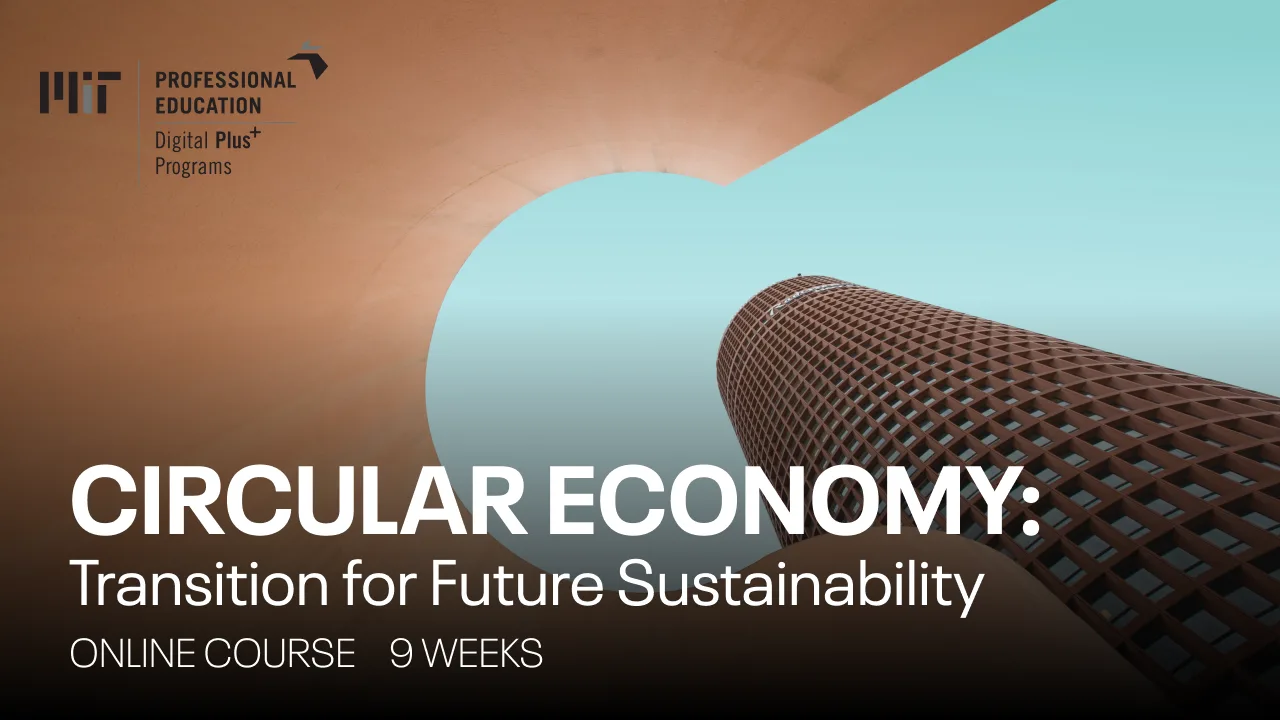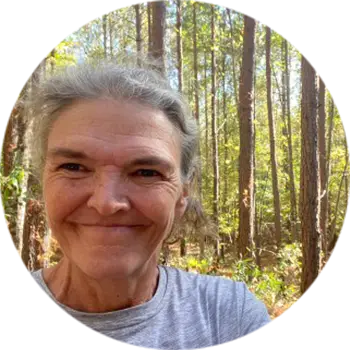This course is part of our Professional Certificate Program in Sustainability and Blended Professional Certificate: Chief Sustainability Officer
How can the circular economy help your organization and simultaneously create a more sustainable world?
By shifting your organization to a Circular Economy, you can ensure growth over time while treating waste as a design flaw. By doing this, we take the outdated linear system and make it circular with resiliency. Circular Economies are emerging as a necessity as the overexploitation of natural resources increases.
In a Circular Economy, there are opportunities to create a sustainable economic growth model, as a specification for any design is that the materials reenter the economy at the end of their use. Therefore, a Circular Economy increases profits while ensuring sustainability, longevity, and societal wellbeing.
1.5 years
Now the Earth takes almost 1.5 years to regenerate what we use in a year.
Source: International Institute for Sustainable Development
9.1%
In 2021, our world economy was only 9.1 percent circular, which leads to a massive circularity gap.
Source: International Institute for Sustainable Development
$700 billion
Circular opportunities for fast-moving consumer goods could amount to USD 700 billion per annum in material savings.
Source: Ellen Macarthur Foundation
An online course for enacting an ethical economic model for a sustainable present and future
MIT Professional Education’s online course Circular Economy: Transition for Future Sustainability presents an encompassing, quantitative, and qualitative portrayal of sustainable solutions from an economic perspective in order to reduce, reuse, and regenerate materials, leading to economic growth, sustainable resilience, and improved society.
The circular economy, when enacted, plays an essential role in addressing climate change, while also creating opportunities that ensure sustainable and ethical economic growth over time.
The skills you will develop
1.
UNDERSTAND
the fundamental definition of a circular economy.
2.
DEFINE THE DIFFERENT WAYS
of reaching a circular economy through technology and material science and how to quantify circularity.
3.
DEVELOP STRATEGIES
for a more equitable distribution of costs and benefits.
4.
DETERMINE INSTITUTIONAL AND ECONOMIC STRUCTURES AND POLICIES
that enable the possibility of a circular economy policy.
5.
DISSECT
successful and unsuccessful case studies in sustainability and circular economies.
6.
FURTHER APPLY THE IMPORTANCE
of recycling plastics and electronics to tackle environmental concerns and e-waste.
7.
GAIN AN UNDERSTANDING
of how material transport plays an influential role in sustainability.
8.
STUDY
the circular economy lifecycle.
9.
APPLY THE BEST ENERGY ALTERNATIVES
for circular economies and uncover the importance of co-mingled waste.
In addition, you will receive a Certificate of Completion
All the participants who successfully complete the online course Circular Economy: Transition for Future Sustainability will receive an MIT Professional Education Certificate of Completion. Furthermore, participants will receive * MIT Continuing Education Units (CEUs)*.
To obtain CEUs, complete the accreditation confirmation, which is available at the end of the course. CEUs are calculated for each course based on the number of learning hours.
* The Continuing Education Unit (CEU) is defined as 10 contact hours of ongoing learning to indicate the amount of time they have devoted to a non-credit/non-degree professional development program.
To understand whether or not these CEUs may be applied toward professional certification, licensing requirements, or other required training or continuing education hours, please consult your training department or licensing authority directly.
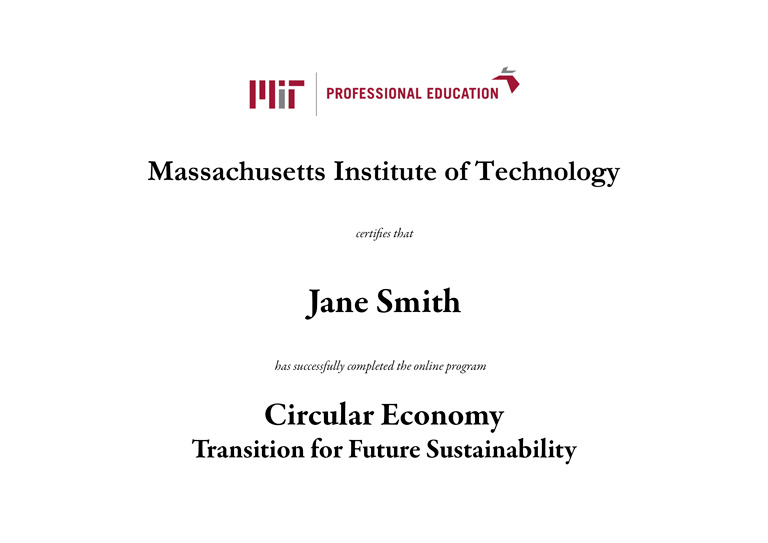
This course is designed for
Professionals from a multitude of backgrounds interested in sustainable actions and innovation opportunities. In this course, participants will examine the numbers and science behind climate change mitigation targets and will analyze solutions from the perspectives of engineering, policy, material science, and business. The professionals poised to benefit most from the expertise and skills shared through this course include:
- Climate Consortium members who aim to vastly accelerate the implementation of large-scale, real-world solutions to meet climate change challenges, while inspiring transformative climate progress across industries and across the globe.
- Industries and sectors that are very material-sensitive wanting to mitigate the impact that they have on the environment and seek out more sustainable and effective methods in the construction process of their materials.
- Managerial level audience (every industry including finance) seeking to develop an understanding of the concepts of infrastructure development and engineering.
- Major companies in Spanish-speaking and Portuguese-speaking countries to promote an international, beneficial, and sustainable influence in their economies
- *In addition, professionals in the fields of marketing, sales, business development, market analysis, consulting, policy, and entrepreneurship will also benefit from the resources offered in this course.
*We recommend that functional and multifunctional teams participate in the course together to accelerate the adoption of sustainable practices.
Meet the instructors of this course
Listed in alphabetical order
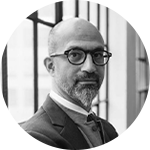
His work in sustainability began with research regarding materials for high performance buildings, low energy residence, and urbanization.
• He founded the MIT Urban Metabolism Group to focus his research on the resource intensity of cities as well as on design and technology pathways for future urbanization, taking part in projects across four continents.
• He is a member of more than 15 organizations, the most prestigious of which being his role on the Board of Directors of the Building Envelope Technology and Environmental Council of the National Institute of Building Science; New Ecology, Inc; and the Center for Sustainable Energy of the Fraunhofer Institute.
• He is also a proud author of two books and numerous articles in scientific and design journals, as well as a speaker for conferences and symposia around the world.
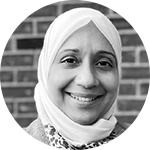
• Siddiqi earned her B.S. in mechanical engineering, M.S. in aeronautics and astronautics, and Ph.D. in aerospace systems, all from MIT.
• Siddiqi earned her B.S. in mechanical engineering, M.S. in aeronautics and astronautics, and Ph.D. in aerospace systems, all from MIT.
• Siddiqi has co-authored one book and over 90 publications in some of the world’s foremost technical and scientific journals.
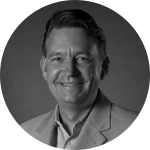
Since 2001, de Weck’s group has developed original quantitative methods and tools that explicitly consider manufacturability, flexibility, commonality, and sustainability, among other characteristics. De Weck’s teaching emphasizes excellence, innovation, and the irrefutable bridge between theory and practice.
• De Weck holds a degree in industrial engineering from ETH Zurich and an M.S. in aeronautics and astronautics from MIT.
• He earned his Ph.D. in aerospace systems from MIT.
• De Weck was an engineering program manager on the F/A-18 aircraft program at McDonnell Douglas.
